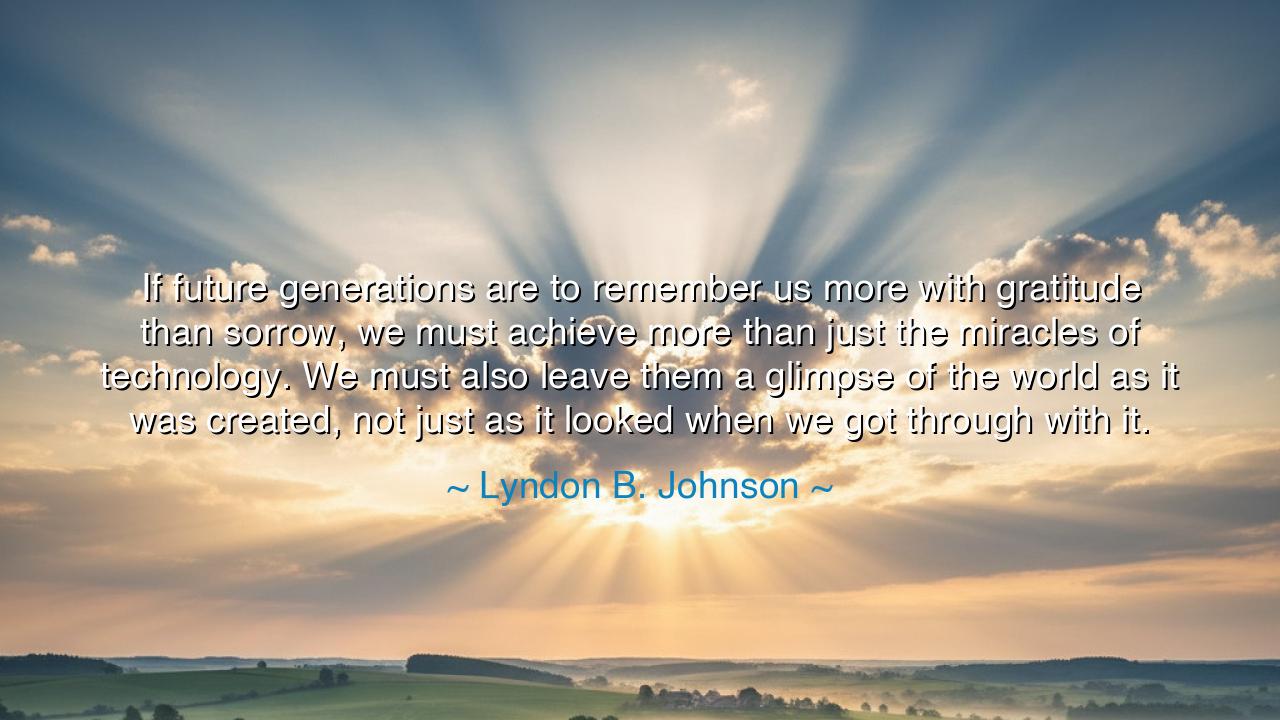
If future generations are to remember us more with gratitude than
If future generations are to remember us more with gratitude than sorrow, we must achieve more than just the miracles of technology. We must also leave them a glimpse of the world as it was created, not just as it looked when we got through with it.






Lyndon B. Johnson's words, "If future generations are to remember us more with gratitude than sorrow, we must achieve more than just the miracles of technology. We must also leave them a glimpse of the world as it was created, not just as it looked when we got through with it," resonate deeply, urging us to consider the legacy we leave behind, not only in the advances we make but in how we honor the natural world. Johnson calls us to reflect on the balance between progress and preservation, between the marvels of human ingenuity and the irreparable damage we may inflict upon the earth. The wisdom in this statement touches on the ancient duty of stewarding the earth, ensuring that we do not ravage it in the pursuit of progress, but instead honor its inherent beauty and resources.
The ancients understood the sacred duty of maintaining harmony between humanity and the natural world. The Greeks, for instance, saw nature as an essential part of the cosmos, one that was both beautiful and divine. Hesiod, in his epic "Works and Days," describes how the earth, with its bountiful harvests, is a gift from the gods that must be cared for. In ancient China, Daoism emphasized the importance of living in harmony with nature, guiding humans to act as stewards rather than conquerors. These ancient teachings remind us that, like Johnson, the balance between advancement and respect for the environment has always been a central consideration for humanity’s well-being.
In more recent history, we see the effects of disregarding this balance. Consider the story of the Dust Bowl in the 1930s, which devastated large parts of the United States. The pursuit of profit and the unrestrained cultivation of land without consideration for the natural environment led to environmental collapse. The soil, once rich and fertile, became dry and unyielding. This tragic event serves as a stark reminder that unchecked progress—in the form of technology and agriculture—can lead to irreversible damage. Johnson’s call to not only focus on technological miracles but to also preserve the world as it was created echoes through history: technological achievements without respect for the earth’s natural order can bring about unintended consequences that future generations will mourn.
Johnson’s insight also draws attention to the importance of wisdom and foresight in leadership. Leaders of ancient civilizations, such as King Solomon of Israel, were revered not only for their ability to lead militarily or politically, but for their capacity to see beyond immediate desires and plan for the future. Solomon’s wisdom was reflected in his governance, where he balanced the demands of expansion with the understanding of natural laws. Johnson’s plea is similar: while it is important to innovate and advance, we must also use foresight and wisdom to ensure that the progress we make today does not come at the expense of the future. We must learn from the past, honor the present, and create a future that reflects the beauty and richness of the world as it was given to us.
The lesson here is profound: legacy is not merely about what we create or build, but about how we preserve and respect the world we inherit. The miracles of technology—while valuable—should not come at the expense of nature’s gifts. Just as the ancients revered the land and sought balance, so too must we ensure that the advancements we make do not strip the world of its natural beauty. Technology, while transformative, must be wielded with responsibility, mindful of the environment that sustains us. We cannot be so consumed with progress that we forget our duty to protect the world for those who come after us.
In our own lives, this means we must strive to live with awareness of our impact on the planet. Whether in the choices we make as consumers, the ways we engage with nature, or the policies we support, we must ensure that we are not simply seeking to exploit resources, but to act as stewards of the earth. It is not enough to innovate; we must also preserve. Every technological breakthrough, every advancement, should be paired with a deeper understanding of its potential impact on the world we leave behind. Let us live in a way that, like the ancients, honors the gifts of nature while forging a path forward that nurtures both human progress and environmental harmony.
Thus, let us take Johnson's words to heart: our legacy is not defined by what we create, but by how we choose to shape the future. The path we leave behind should be one of balance—where technological achievements go hand in hand with a deep respect for the world as it was created. Let us not forget that every action we take today is the foundation upon which future generations will build. Let us live, not just for the moment, but with an eye toward the world we will leave for those who come after us. The future lies not just in the miracles we create, but in the legacy we leave in the way we respect and preserve the natural beauty of our world.






AAdministratorAdministrator
Welcome, honored guests. Please leave a comment, we will respond soon